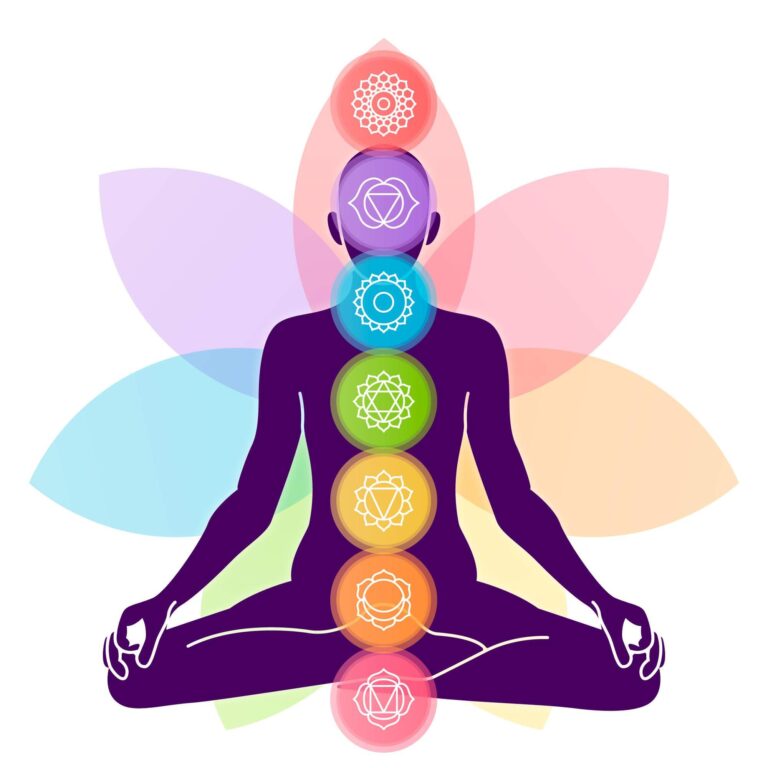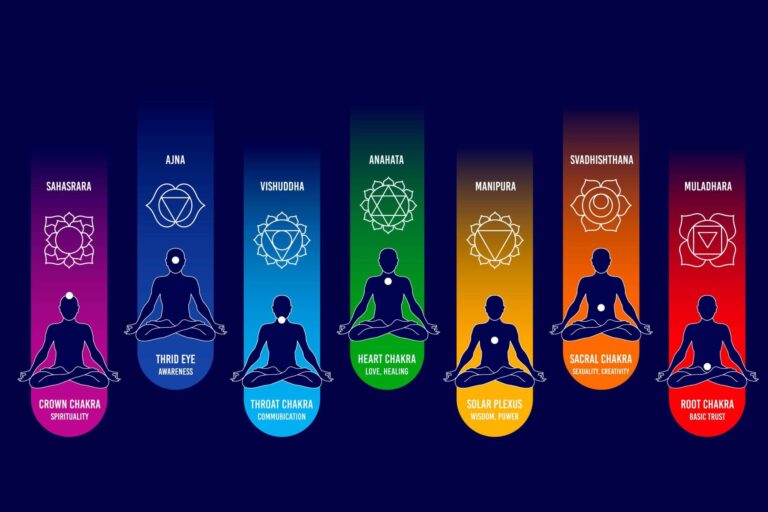What Are Chakras in Human Body?

In the yogic culture, the word “chakra” literally means “wheel.” But the 7 chakras in human body are not in the shape of a circle or wheel. Instead, they are in the form of triangles. They are spinning energy centers in our bodies. Chakras are not something fancy, as mentioned in sci-fi, comic books, or anime. They are actually a part of our subtle nature (energy body).
In the human system, there are 72,000 nadis. These nadis are channels for energy (prana) to flow throughout the body. Chakras are basically the energy centers where the nadis meet. The body consists of 114 chakras, and the 7 are considered the major junction points or chakras that are known to be most significant.
To be healthy physically and mentally, the chakras must be balanced. Blockages or imbalances of these might lead to several problems in life that you may need to be aware of.
7 Chakras in Human Body And Their Significance

1) Mooladhara (Root chakra): It is located at the base of the spine. It takes care of the survival and maintenance of the human body. This chakra is also responsible for a sense of stability and security in one’s life. It keeps you feel grounded and firm.
2) Swadhisthana (Sacral chakra): Located just a few inches above our genitals. This chakra is responsible for your sexual and creative energy as well as your emotions. Hence, a balanced sacral chakra helps you maintain good relationships, a sex life, and creativity.
3) Manipuraka (Solar plexus): It is located just above the navel. This chakra relates to willpower, self-confidence, focus, and taking action. It also takes care of your digestive organs.
4) Anahata (Heart chakra): It is located near the heart, the center of our chest. A balanced heart chakra makes your life full of love and compassion and acts as a center of empathy and forgiveness.
5) Vishuddhi (Throat chakra): It is located in the pit of your throat. It deals with verbal communication, clarity of voice, self-expression, and the ability to speak the truth.
6) Ajna (Third eye): Located at the center of the forehead between the eyebrows. Physically, the third eye is directly connected to the Pineal gland. It is responsible for intuition, clarity, foreseeing, and imagination. A balanced third eye results in a peaceful life.
7) Sahasrara (Crown chakra): The Sahasrara is located at the top of the head. It is related to spirituality and acts as a bridge to the cosmos—balanced Crown chakra results in an ecstatic experience of life.
Click on this link to know how chakra blockages lead to diseases
How To Balance Chakras?
There are a lot of practices that one can do to bring balance into every aspect of life. As the chakras get into a balanced state, one leads an exuberant and joyous life.
Certain practices like yoga, visualization, sound healing, being out in nature, and meditation help to activate them. Mainly, pranayama in yoga stimulates every chakra, resulting in the opening of nadis so that energy flows efficiently.
Click here to learn more about yoga and its importance
Balancing Root chakra: This is associated with the element earth. It is the foundation for physical life. Striking a yoga pose Utkatasana (Chair pose) makes you feel grounded to earth, chanting the seed mantra “LAM,” going out and walking barefoot on the grass or soil, taking a cold shower, and visualizing the red color at the base of the spine will certainly activate Mooladhara.
Balancing Sacral chakra: It is associated with the element Water. As this deals with one’s creativity, emotions and relationships, the best thing to do is stop reacting to the situations around you. Chanting the seed mantra “VAM,” doing some hip-opening yoga poses, and mindfulness meditation will help balance Swadishthana.
Balancing Solar plexus: This is related to the element Fire. Chanting the seed mantra “RAM,” being out under the sun, repeating positive affirmations about personal power and confidence, and getting over past trauma will help activate Manipuraka.
Balancing Heart chakra: It is associated with the element Air. Seed mantra “YAM,” affirmations such as “I am open to love” and “I forgive myself and others,” deep breathing exercises will help stimulate Anahata.
Balancing Throat chakra: This is associated with Sound. Chanting the seed mantra “HAM,” speaking when needed, drinking plenty of water and herbal teas, and focusing on the breath going through your throat will help balance Vishuddhi.
Balancing Third eye chakra: This is associated with Light. Chanting the seed mantra “AUM,” breathing consciously, focusing on the third eye while doing practices like Shambhavi Mahamudra, and regular meditation will help balance Ajna.
Balancing Crown chakra: It is associated with the Cosmos (source of creation). Expressing gratitude to the creation around you, meditating, and chanting the seed mantra “AUM” is beneficial for Sahasrara.
“Chakras are energy awareness centers. They are the revolving doors of creativity and communication between spirit and the world.” — Michael J Tamura.
